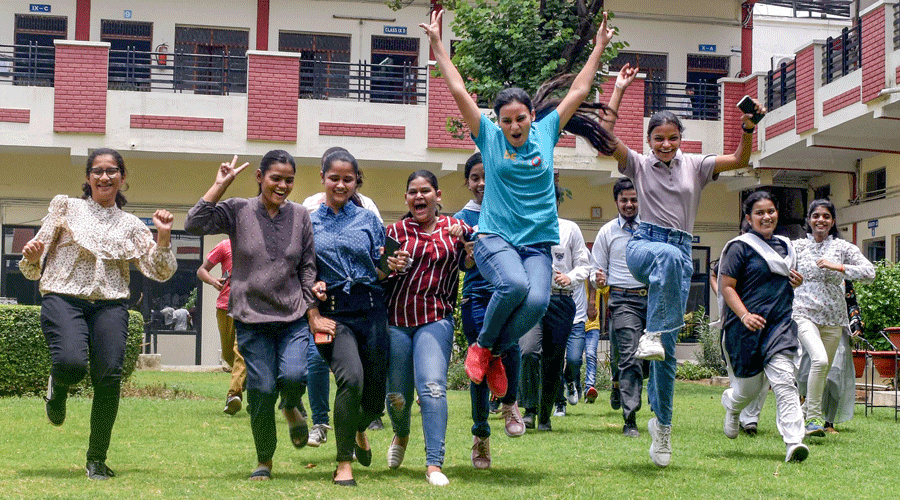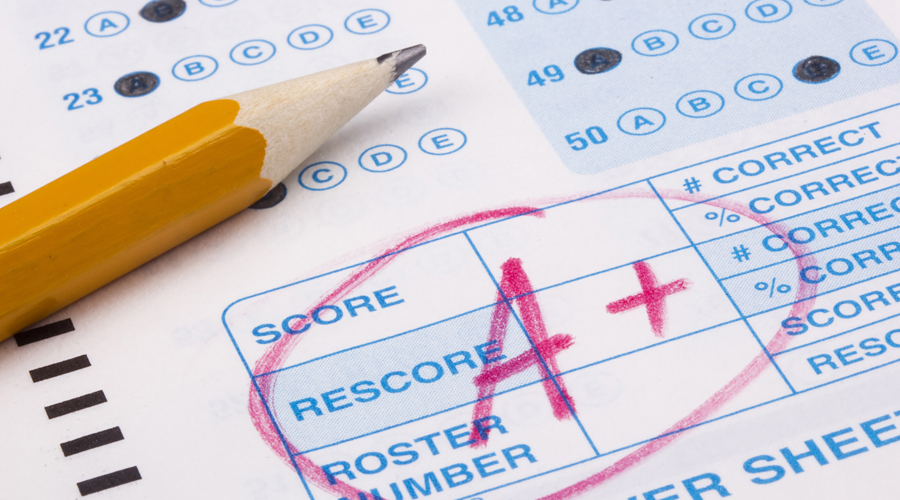The CBSE has given 30 per cent weightage to students’ Term-I scores and 70 per cent to their Term-II scores while determining their Class X and Class XII board results, which were announced on Friday.
This appears a tacit acknowledgement of the complaints received about unfair means being adopted during the Term-I exams, held mostly at home centres, although the board has never officially admitted any malpractice.
Uniquely, the 2022 CBSE exams for Classes X and XII were held in two parts: a Term-I exam in multiple-choice format at the students’ own schools late last year, and a Term-II exam in the normal subjective form in April-May this year.
The split was effected so that the scores in the Term-I exam — held during a relative lull in the pandemic — could be taken as the final result if Covid prevented the Term-II exams this year.
Since the syllabus was divided 50-50 between the two exams, it was expected that the weightage given would be 50-50 too.
However, while announcing the results, the board said the weightage accorded was 30-70.
Educationist Ameeta Mulla Wattal said the results were fair.
“This is a fair exam. There are instances of underprivileged students emerging school topper. In Ridge Valley School, the topper is a poor student who received a scholarship,” she said.
Trends
The percentage of Class XII students who have scored above 95 per cent in aggregate is 2.33 — below the figures of 5.37 in 2021 and 3.24 in 2020 — but above the 1.47 per cent registered in the “normal” or pre-Covid year of 2019.
The picture is the opposite in Class X: 3.1 per cent have scored over 95 per cent — above the figures of 2.76 per cent in 2021 and 2.23 per cent in 2020 but below the 3.25 per cent witnessed in 2019.
Many had feared a poor overall performance this year given the changes made, such as a split exam and MCQs, apart from the pressure of taking a regular board exam (Term-II) at outside centres after two years of Covid-induced disruptions in academic activities.
Further, the introduction of the CUET for admission to central universities meant many students had to prepare separately for the national entrance test.
However, the overall results have been good, with the pass percentages in both Classes X and XII easily outstripping the figures of 2019 and 2020 and trailing only those of 2021, when no board exam was held and the scores were based largely on assessment by the students’ own schools.
The pass percentage this year is 92.71 in Class XII (compared with 83.4, 88.78 and 99.37 per cent in 2019, 2020 and 2021, respectively) and 94.4 per cent in Class X (compared with 91.1, 91.46 and 99.04 per cent in 2019, 2010 and 2021, respectively).
Liberal marking
Some educationists suggested that the good showing despite the challenges reflected not just the continuation of the liberal assessment of past years — which many say partly devalued board marks — but a heightening of the practice.
“Compared with 2019, the pass rate has gone up. In Class XII, the percentage of top-scoring students too has increased. I feel the assessment system needs to be tightened by checking the inflation of marks,” former CBSE chairman Ashok Ganguly said.
He said the introduction of the CUET had turned the board exams into merely a qualifying exam for many students. The boards, therefore, need to strengthen the assessment system all the more to stay relevant.
Ganguly said split board exams should be discontinued because conducting them becomes a huge challenge for the board and the schools.
The Term-I exams had given rise to complaints of large-scale malpractice at the home centres, with critics alleging that students of schools that conducted the exam honestly had lost out. One of those who complained to the board was National Progressive School Conference principal Sudha Acharya.
Acharya on Friday said this year’s batch should be treated as a “unique batch”.
“They not only faced two term exams, many of them will appear in the CUET. Classes were not held normally, either, because the schools were closed in the initial months,” she explained.
Prateek Arsh, a student who scored 95.5 per cent in Class XII, said the Term-I exam witnessed a lot of defective questions. Although full marks were awarded eventually to whoever attempted them, these questions had left the students confused in the exam hall, eating up valuable time.
“Then in March, the University Grants Commission announced the introduction of the CUET. The late announcement made students a little nervous because they had to prepare for the CUET’s general study paper (whose content is not taught in schools),” he said.
“The students had to balance their preparation for the CUET and the board exam.”
Some 14.35 lakh students took the Class XII exam, with 13.3 lakh passing, and 20.93 lakh sat the Class X exam, with 19.7 lakh successful.











